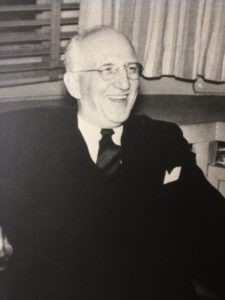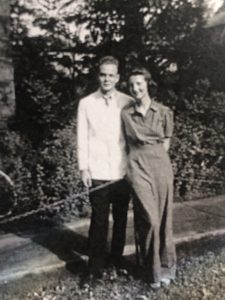Compromise, Resistance, or Both
![]()
As we careen toward November’s elections, we often worry about compromising vs resisting. Bombs are being sent, caravans are marching toward us, and folks are being killed in embassies. Candidates disrespect each other without restraint. Even though listening and compromising seem key to our progress forward, we cannot forget the 15th Century martyrs who resisted unto death. Compromise was not emblazoned on their banner. What to do as an Anabaptist serving God’s Kingdom, and as a person who cares about her/his democracy?
My father and my grandfather enjoyed corresponding and discussing social/political concerns, which meant arguing in elevated tones. It was an integral component of their relationship. Grandpa ran a clothes manufacturing factory in an Anabaptist town in the Midwest, while my father came from Long Island, a few miles outside Queens, and had met my mother at Oberlin College. Recently, I found this letter from 1943, when my 23-year-old father was in the military and married to my Mennonite mother. It speaks to a young man’s search for the right pathway through the prickly woods of resistance and compromise. How modern it sounds!

“Tuesday evening, December, 1943
Dad [Carl T. Habegger of Berne, Indiana], you mentioned the fact that the most valuable type of reading is to read all sides and then take the middle course. In many ways you may be right, but there are times when compromise, even with both the left and the right, is not wise. For example, to be called a ‘leftist’ radical, all you have to do is state an idea which disturbs or upsets the status quo of the majority or more specifically the controlling group. Our nation has been lulled into a state of smug satisfaction which is founded on prejudices and petty hatreds. The nation has been lulled into this state by the big money men of the country: the men who control education, the press, the radio, and every field of transportation and enlightenment. If you believe that these men should be dethroned and the people of America put into the driver’s seat, how can you take a middle course? Your idea is in direct conflict with the wealth of the nation and their innocent accomplices—the majority of middle class Americans who have been affected by the power group’s propaganda. You will be persecuted, lied about and maybe harmed physically because you believe in that idea. How can you take a middle course and still maintain your thought and desires for a better country? This power group will offer every temptation in the book to buy you out. Certainly you can’t compromise there. These guys aren’t playing for peanuts, they are playing for a stranglehold on the richest country in the world and will go to any extreme to get it…
In this part of the letter, my father bows to his father-in-law’s action and courage, a wise move on the younger man’s part. My grandpa testified to Congress against JC Penney’s monopoly in the garment industry, and took on his church and town (as newspaper editor) when he felt it necessary.

My father, not yet a pacifist, continues:
…In 1936 the people of Spain were forced to make a decision. Should they live under their new republic or should they submit to a fascist invasion. Those people knew that fascism was more powerful than their new replubic but they also knew that to compromise with it would mean defeat in the end. Every one of those Loyalists fought to preserve his freedom. They might have disagreed with their leaders’ methods but never once did they think of a middle road concerning their ideals. They had read both sides, racist and loyalist, and when they chose loyalist they knew that they could never take a middle road and survive as free people.

I don’t want to appear as a 23-year-old wise guy, [Oh, how my sisters and I are grinning at that—our dad was a wise guy all the way through his experiences with the Mennonites!] but I think the only way I can grow is to put my ideas on paper and exchange them with other people. By disagreeing and being forced to find what is wrong with your beliefs is the only way you can crystalize your viewpoints. I think you made a serious error when you said “I realize how important it is to avoid associating and reading the ideas of just one class or group, but to study all sides and then follow a middle course, knead of being to the extreme in either direction.” Maybe you didn’t mean it the way I took it but to me it is a very misleading statement. You might be right when speaking of methods but there are times, unfortunately, when a thing is either right, according to your ideals, or it is wrong. You can’t compromise then.
Enough of my prattle…
Love,
Jack”
____________

How affirming it was for many of us Anabaptists to grow up in middle class families that encouraged such discourse as every day fare. These exchanges informed our understandings of democracy, kindness, and strength, while honoring our belief in the separation of church and state.
Consider following Dr. Carolyn J. Lukensmeyer and The National Institute for Civil Discourse.
Both compromise and resistance require humility as well as courage. Listening and acting for the greater good are painstakingly difficult.
What do not require courage or humility are watching the TV news late at night and rudely tweeting at the nation in the early hours.
____________
I welcome your comments: gretaholtwriter.com/blog.
{Thank you to my niece, Addie Liechty, for taking the picture that is this blog’s featured image. Her blog is: https://addieswriting.wordpress.com.}
Best wishes and have a good week.
Greta
Greta, I really enjoy reading of your fore bearers, Thanks for sharing that. My background is quite unlike yours, I had no interaction with any service members as a kid. The attitude was much more focused; black or white.
How interesting our various Mennonite experiences are. In accepting this, church visioning becomes a process that deserves time and generosity!
Hi Greta! Such a balance! I am finding it hard to compromise these days. How does one compromise with hate? I really enjoyed reading your family’s letter exchanges. I think these underscore part of our global communication issue–time. Letters take time and thought. The process of writing our thoughts in letters helps us shape our thoughts, evaluate them; when we respond to others’ letters, we have taken the time to read them, digest them–hear the words within. Tweets, even emails, are more immediate, often knee jerk reactions, often just putting our basest selves out into cyberspace. I am not sure what the answer is but conversation around these questions is the start. Thanks for opening the discussion and asking the questions! P.S. I live on Long Island! What part was your dad from?
Dad grew up in Lynbrook and was born in Malverne. You know, some folks are saying that we must start civil discourse amongst ourselves: the Democrats are trying to figure out how not to back down from a bully, so their responses are harsh. We seem caught in that ‘stand up to the bully’ place. We the people may have to do all the heavy lifting in our communities.
Greta,
What a delightful letter – and one with many lessons worthy of great discussion. Interesting how the substance can be applied to countless situations through the years – let alone today. I agree, sometimes compromise isn’t the best course. Sometimes it is one of the choices – and then there is the forgotten choice – not one, not the other, not the compromise, but the one outside the realm.
Oh, ‘the one outside the realm’ intrigues me. Mennonites assign meaning to that as representing the Kingdom of God on Earth. But ‘outside the realm’ gives leave to search for any responses that are creative and useful.
Grandpa Hobby’s openness to listening to arguments from different sides gave this young man’s searching the opportunity to take form as written communication. Our differences are functional. We don’t all have to make the same decision.
Used to love as a 7-8 yr old child lying next to Grandpa on the daybed in his home office, listening to him “philosophize .”
Oh yes. What a philosophizer he was. How I wish we could talk to him as adults.
[…] From blogger Greta: A timeless letter from a son to the father that is worth pondering […]